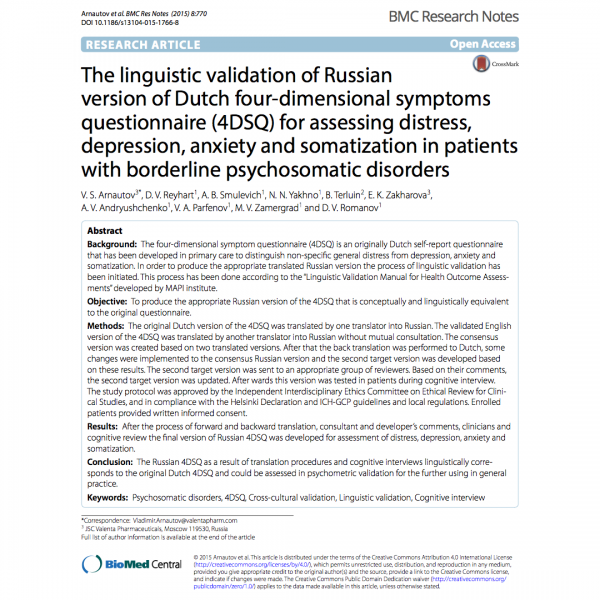
Valenta Participates in Introduction of a New Diagnostic Tool
23.12.2015
In December 2015, BioMed Central publishers in their Research Notes international journal published the results of linguistic validation of a questionnaire for assessment of vegetative psychosomatic disorders, which was arranged in Russia for the first time under the initiative and with the support of Valenta. Today doctors have an opportunity to use this convenient diagnostic tool to help patients suffering from vegetovascular disorders.
Vegetative nervous system disorders remain frequent reasons of Russian patients’ visits to therapists and neurologists of outpatient clinics who face problems with diagnostics due to time limitation. The disease is accompanied with many non-systemic complaints, and patients often need to make repeated visits to specialists. In the absence of precise diagnostic algorithms, the disease identification becomes quite difficult. Such patients are called «difficult» and get a diagnosis of vegetovascular dystonia (VVD) at best. Most often these patients receive prolonged treatment with cardiovascular, nootropic or sedative medicines, without any steady effect, while doctors are trying various plans and courses of treatment, spending money and time of patients and public healthcare system.
Today we know that different mechanisms of nervous system functional disorders make the basis of VVD; these mechanisms are closely connected — besides others — with mental pathology. We need a special tool, not less useful for everyday diagnostics than a stethoscope, thermometer or tonometer, to elaborate the adequate algorithm of treatment and to choose the right specialist if we suspect VVD at primary examination. Valenta addressed the medical community with an initiative to create such tool.
Summarizing foreign and Russian clinical experience Russian doctors chose 4DSQ questionnaire (Four-Dimensional Symptom Questionnaire) for identification of distress, depression, anxiety and somatization, developed by Dr. Berend Terluin, Senior Researcher of the Department of Therapy and Gerontology at EMGO Research Institute, Medical Center at the University VU Amsterdam (Netherlands). The advantage of the questionnaire is that it opens opportunities both to identify these 4 syndromes (distress, depression, anxiety and somatization), choose a correct method of therapy and to assess the dynamics of treatment.
A linguistic validation is needed to correctly adapt the diagnostic tool developed in foreign language for Russian-speaking doctors and patients. Within the validation, the whole series of experiments aimed at the development of a new questionnaire are reproduced anew, and additional statistic tools are applied. Only in this case the foreign questionnaire will be a precisely adjusted diagnostic tool. The validation arranged lege artis is a warranty of that the terms and phrases used in the Russian version are equivalent to the original and equal by perception within the corresponding language environment.
The joint group engaged in validation of 4DSQ questionnaire included Russian neurologists and psychiatrists from I.M.Sechenov First MSMU was led by N.N. Yakhno, D.M., Professor, Director of the Research and Educational Clinical Center of Neurology; A.B. Smulevich, D.M., Professor, Head of the Department of Psychiatry and Psychosomatics, and V.A. Parfenov D.M., Professor, Head of the Department of Nervous Diseases and Director of the Clinic of Nervous Diseases.
Successful studies of the Russian-language version of 4DSQ were arranged within START and START-2 observational programs, organized with the support of Valenta, in which more than 10,000 patients and 250 neurologists participated. Studies of 4DSQ questionnaire proved its high sensitivity and specificity and allowed to recommend it for implementation in the everyday domestic clinical practice. In February 2015, the first materials were published by Korsakov Journal of Neurology and Psychiatry, and in December, the results of the questionnaire linguistic validation were presented by BioMed Central publishers in their Research Notes international scientific and practical journal.
In 2015, Russian specialists started to implement the diagnostic tool in their everyday clinical practice. The 4DSQ questionnaire and the algorithm of answers analysis were given to doctors in printed form. On the basis of the diagnostics, a neurologist or therapist can make decision to prescribe effective medicines or obtain information that the patient needs to visit a psychiatrist. A series of training lectures was arranged for doctors in the RF regions, and now an opportunity is considered to create electronic versions for PC and mobile devices, and the system of centralized data analysis to carry out a full-scale all-Russia screening in the future. Besides, the questionnaire implementation as an auxiliary tool for research programs in other therapeutic areas, for example, in gastroenterology, where functional disorders of gastroenterological tract are frequently connected with somatization of psychoneurological status is planned.
Ekaterina Zakharova, Medical Director, JSC Valenta Pharm: «The 4DSQ questionnaire is an effective tool for primary differentiation of mental disorders and improvement of quality of medical aid to patients in conditions of daily clinical practice. Valenta focuses its efforts on the development and transfer of high-end and innovative medical technologies within Russian healthcare system in the therapeutic areas, where our business interests are presented.»
